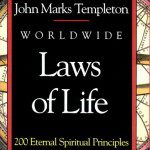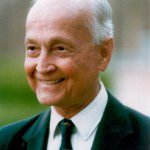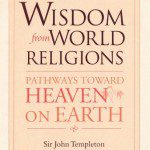 Each morning I do a little reading as part of my spiritual practice. And over the years, the one book I have turned to more than any other is The Worldwide Laws of Life, 200 Eternal Spiritual Principles, by John Templeton. A close second would be Wisdom from World Religions, Pathways Toward Heaven on Earth by the same author. They are the equivalent of my Old and New Testament.
Each morning I do a little reading as part of my spiritual practice. And over the years, the one book I have turned to more than any other is The Worldwide Laws of Life, 200 Eternal Spiritual Principles, by John Templeton. A close second would be Wisdom from World Religions, Pathways Toward Heaven on Earth by the same author. They are the equivalent of my Old and New Testament.
I have read through each of these thick texts twice and as their titles imply, they provide both wisdom and guidance. By reading a couple pages in the morning, I get a daily dose of spiritual nourishment, every bit as important as the vitamins I take. They put my head in the right space for the day ahead with lessons on love, virtue, gratitude and forgiveness.
Almost as compelling as the knowledge inside these books is the man who wrote them. The late John Templeton may best be known as the investment guru behind the Templeton Funds, but he was a man who combined two full lives into one. Believing that while science has advanced over the centuries, religion was in the dark ages, he devoted much of his life to the pursuit of spiritual understanding and discovery.

Templeton bequeathed the billion-plus dollars he made in his lifetime to a foundation that bears his name. Today, the Templeton Foundation spends tens of millions annually researching the scientific underpinnings of faith and religion. In addition, his annual Templeton prize, valued at well over a million dollars, has been given to the likes of Mother Teresa and the Dalai Lama.
But for me, even more important are the several vital religious and spiritual texts he authored. While raised a Presbyterian and strongly influenced by his Christian faith, Templeton did not believe that any one religion had a monopoly on the truth. So he began collecting the wisdom that made the most sense to him, pulling pieces from all of the world’s religions, as well as various authors and philosophers, until he had in fact created what amounts to a new belief system.
Interestingly, Templeton once used the following words to describe the life of the astronomer Ptolemy: His genius lay rather in his extraordinary ability to assemble the research data of his predecessors, to introduce improvements of his own, and to present the result as a logical and complete system, written in a readily intelligible form.
 And that’s what Templeton himself has done with these two major works, The Worldwide Laws of Life and Wisdom from World’s Religions. There are quite literally words to live by, and below I offer just a few samples of this treasure trove of inspiration and guidance. While Templeton uses a lot of short quotes and excerpts by others to illustrate his points, all words below are from the author himself, except where noted.
And that’s what Templeton himself has done with these two major works, The Worldwide Laws of Life and Wisdom from World’s Religions. There are quite literally words to live by, and below I offer just a few samples of this treasure trove of inspiration and guidance. While Templeton uses a lot of short quotes and excerpts by others to illustrate his points, all words below are from the author himself, except where noted.
On Love
Love is an inner quality that sees good everywhere and in everybody. It insists that all is good, and by refusing to see anything but good, it tends to cause that quality to appear uppermost in itself and in other things. Love takes no notice of faults, imagined or otherwise.
On Beauty
Is your life beautiful? Do you live in surroundings that you have made beautiful through your own unique, creative ideas? To expect and lovingly require beauty to be apparent in all areas of your life is to be deeply loving to yourself, your soul, your world, and shows reverence to God and all of life.
On Seeing the Good
Seneca said, “Eyes will not see when the heart wishes them to be blind.” How can we open our inner eyes and begin to see with the “eyes of the spirit”? By lifting our vision. By choosing to look for the good in all situations. By deciding to place our attention on workable solutions to problems rather than focusing on what we perceive as wrong.
On Going with the Flow
We have the ability to work with the forces in our lives in various ways to experience greater expression of who we are and what we’re capable of being. We can choose to work with and not against the spiritual forces of life and to experience the good that is present for us.
On True Wealth
If we have not developed a reservoir of spiritual wealth, no amount of money is likely to make us happy. Spiritual wealth provides faith. It gives us love. It brings and expands wisdom. Spiritual wealth leads to happiness because it guides us into useful and loving relationships.
On Purpose
Your mission in life is to have a “why” to live for, to use your best qualities in the service of the kind of world in which you would like to live. That is your purpose. That is what life expects of you.
On the Silence of God
Sometimes when our prayers seem to be unanswered, we may feel that we are not in tune with the timeless, unlimited universal Creator called God. But nothing can be separate from God. Everything that touches you, everything that touches each individual in the universe, is a part of God. The divine ideas we receive from God in the silence are like manna from heaven. The pour forth through us ever new, ever alive, ever beautiful, ever more wonderful every day.
On Flow
The wonderful substance of God flows in and through us and extends from us in every direction. Truly, there is no place we can go where we are not bathed in the infinite sea of the substance of the universe. (We may) open the channel for good to flow to us…and the many ways good can flow from us?
On Resting in God
The place of inner stillness and quiet is termed “the Silence”. We enter an elevated state of awareness, of heightened receptivity, a time of being fully alive to the moment. It may sound strange, but when we are in the Silence, we do absolutely nothing. We are content just to be, and we luxuriate in the ecstasy of being consciously with God.
You can find more wisdom from John Templeton by clicking here.
















